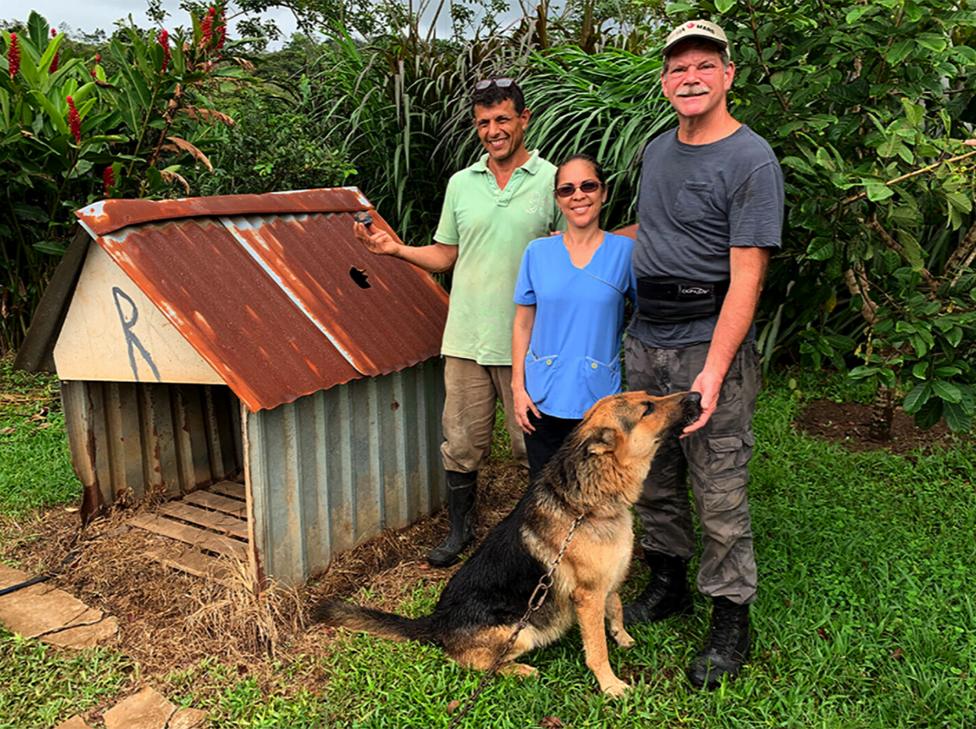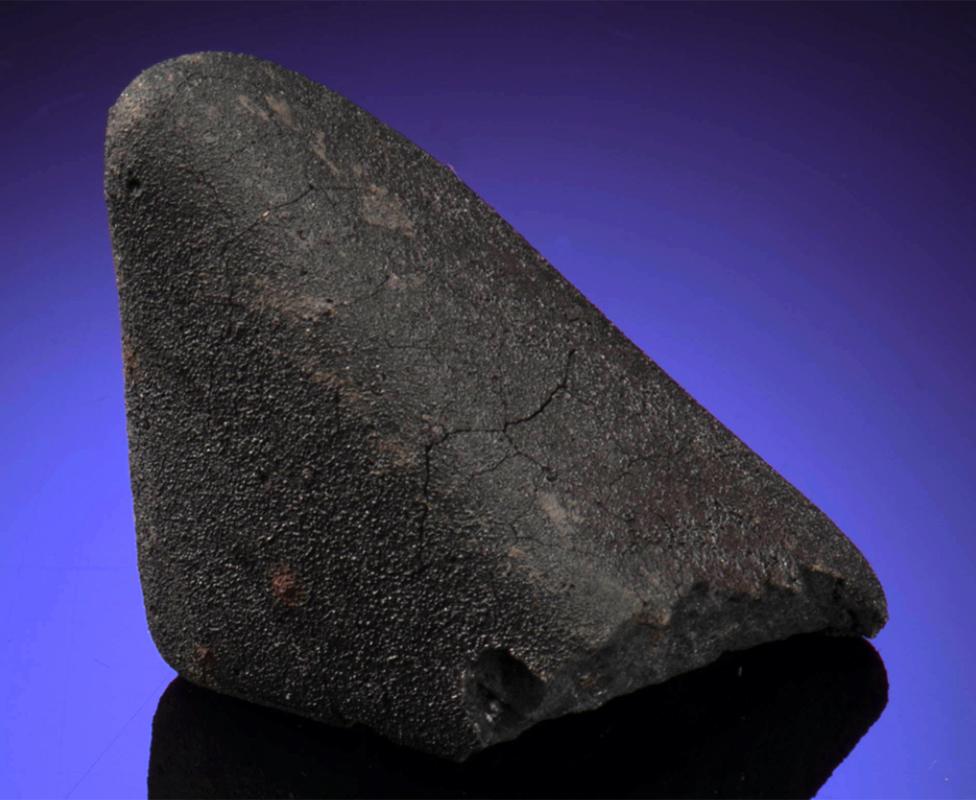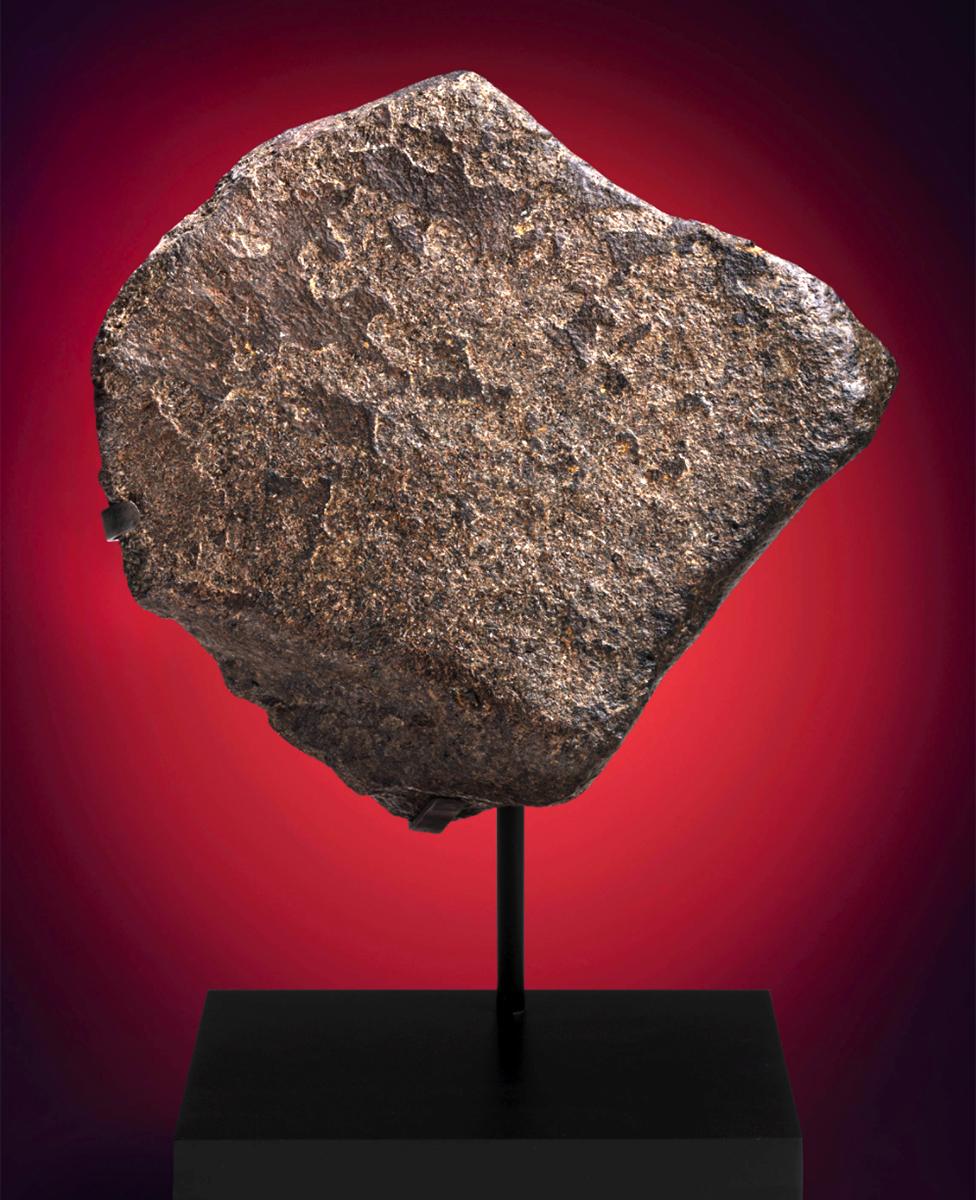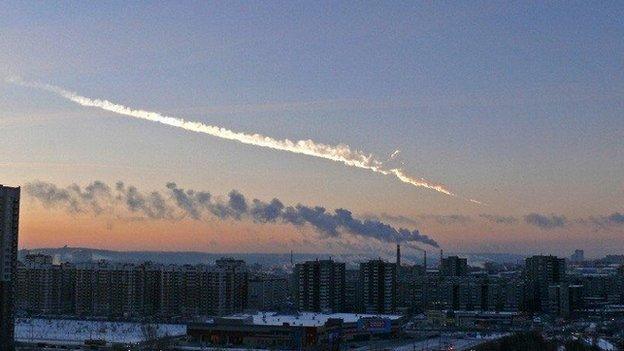Christie's auction: Kennel hit by meteorite goes on sale
- Published

Roky the German Shepherd came to no harm
A chunk of Mars, some of the space rock that splattered a quiet English town and a dog kennel pierced by an object that came out of the sky.
All three items go under the hammer on Wednesday when London auction house Christie's holds its annual sale of rare and unusual meteorites, external.
Lots in the online auction are expected to fetch well in excess of £2m ($2.7m).
UK interest will be on a 15g fragment of the meteorite that fell over the Cotswold town of Winchcombe last year.
It could go for up to £50,000 ($70,000) - or more than 70 times the value of its weight in gold.
It will be among the largest pieces ever to be held in private hands.

In total, 602g of Winchombe meteorite were recovered. This sale fragment is 15g
The Winchcombe meteorite is regarded scientifically as the most important meteorite ever to be recovered in the UK.
It's what's known as a CM2 carbonaceous chondrite and contains chemistry that existed at the formation of the Solar System some 4.6 billion years ago.
The vast majority of what was collected in and around Winchcombe - over 90% of it - is in the UK's national collection, curated by London's Natural History Museum.
Christie's actually has two pieces for sale, although the second item is much smaller at 1.7g.

NWA 12690 is the third largest piece of Mars on Earth
Whatever the final price these rocky splinters fetch, it underscores the great generosity of those Cotswold families that had material land on their properties on 28 February, 2021, but who then decided to donate their finds to science. They could easily have sought a big personal payday.
Christie's has been running a meteorite event every year since 2014. It pulls in lots from across the world. Some items come from existing private collections, others have been newly sourced by professional meteorite hunters.
Star items this year, alongside the Winchcombe fragments, include a big 9kg Martian meteorite, which has an estimated value of up to £590,000 ($800,000).
Called NWA 12690, the rock would have been blasted off the surface of the Red Planet by a colossal asteroid or comet impact. It would then have spent time travelling through space before falling to Earth in Mali, in northwest Africa, where it was picked up by a nomad.

The Chelyabinsk event lit up the sky
One lot contains more than 100 tiny shards from the meteoroid that exploded over the Russian city of Chelyabinsk in 2013. The event is remembered for the spectacular streak of light in the sky that accompanied the incoming rock, and which was captured on countless vehicle dashcam recorders.
And of particular interest in this sale will be the Costa Rican dog kennel belonging to Roky the German Shepherd. The tin roof of his wooden house was holed by a meteorite in 2019.
Remarkably, the estimated value of £150,000-£220,000 ($200,000-$300,000) is more than for the actual space rock that did the damage.
"To value all the items in the auction, I work to the four S's - size, shape, science and story," explained James Hyslop, head of the science and natural history department at Christie's.
"The story and its provenance play a very important role in determining the value," he told BBC News.
"My first question when I was offered the dog shed for auction was: 'Was Roky okay?'. I'm pleased to report that other than now being 'sans' dog shed, he's doing just fine."
Timelapse video shows how the Wilcock driveway was lifted for display
Objects hit by meteorites have a history of fetching big sums at auction.
A mailbox torn off its post in Claxton, Georgia, US, was sold at auction in 2007 for £61,000 ($83,000). And an old Chevrolet Malibu car struck by a meteorite in Peekskill, New York, in 1992 changed hands for £170,000 ($230,000) nearly 20 years later.
Winchcombe made headlines in part because the fall left a sizeable dent in the driveway of the Wilcock family. The square metre of asphalt was subsequently lifted to go on display at the Natural History Museum. Were this scarred section of driveway ever to come up for auction, it too would likely command a very high price.
As far as the science of Winchcombe is concerned, there is ample material (over 500g) in the national collection to enable researchers to investigate the origins of the Solar System.
"The Japanese Hayabusa mission returned 5.4g from the asteroid Ryugu and that's keeping hundreds of scientists busy. But we have much to thank the Winchcombe families for in making their donations to the national collection. They are real heroes of science," said Prof Sara Russell from the Natural History Museum.
